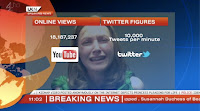As you all know by now, 1984 and V for Vendetta share some important topics such as totalitarian system, oppression,
repression, complete submission, propaganda, and the use of technology to
monitor people and maintain control.
"The two aims of the Party are to conquer the whole surface of the earth and to extinguish once and for all the possibility of independent thought."
The concept of rebellion is also shared but
it differs because Winston, as the hero and figure of rebellion is just one
person against the system and whose actions are being closely observed; whereas
V has made himself an idea, a shadow that cannot be stopped.
There is another relevant topic shared, which
is betrayal. Within V for Vendetta it obeys a purpose and you can take
something good from it.
-The first instance is when V goes to talk
with Madam Justice and explains that her infidelity has taken him away from
her.
“You
are no longer my justice, you are his justice now. You have bedded
another.”
And says that he is now with Anarchy.
“Her
name is Anarchy and she has taught me more as a mistress than you ever did! She
has taught me that justice is meaningless without freedom. She is honest. She
makes no promises and breaks none. Unlike you, Jezebel.”
-A second instance is the process to set
Evey completely free. She felt betrayed by V but eventually realizes his motive
to do it.
-Finally, there is an implicit betrayal
subtly presented which is the one that people made against themselves as they
did nothing to keep control of their own lives.
When it comes to 1984, it seems to me that
the notion of betrayal is stronger.
While reading we begin noticing that the
strength of the Party lies on this sort of fanaticism that came from the people
which implies a loyalty for the system. Family and friend relations have been
destroyed, and children are encouraged to report any suspicious activity made
by their parents. An example: Parsons was denounced by his daughter.
Sexual desires and every natural human
impulse are being suppressed hence throughout the whole novel it is perceived a
betrayal of people against themselves in form of deprivation of their selves.
Then comes the most noteworthy betrayal,
which came from the relation between Winston and O'Brien, and was the one that
motivated me to choose this topic.
Winston and O'Brien
-First conceptions: At the beginning Winston does
not know much about O'Brien, but naively believes that he is somehow a partner
(actually we all believe it for a while; at least I did).
"Winston had seen O'Brien perhaps a dozen times in almost as many years. He felt deeply drawn to him, and not solely because he was intrigued by the contrast between O'Brien's urbane manner and his prize-fighter's physique. Much more it was because of a secretly held belief -or perhaps not even a belief, merely a hope- that O'Brien's political orthodoxy was not perfect. Something in his face suggested it irresistibly. And again, perhaps it was not even unorthodoxy that was written in his face, but simply intelligence. But at any rate he had the appearance of being a person that you could talk of if somehow you could cheat the telescreen and get him alone."
-Deceit: O'Brien takes advantage of the
attraction that Winston feels for him, and presents himself as a friend, a
confident, and a partner against the Party.
-Revelation: Truth eventually comes out when
Winston sees O'Brien in the Ministry of Love.
" 'Don't deceive yourself. You did know it -you have always known it.' Yes, he saw now, he had always known it."
Winston ends up emotionally compromised towards
O'Brien and (it seems to me) a bit of Stockholm syndrome can be perceived.
"He felt very cold, he was shaking uncontrollably, his teeth were chattering, the tears were rolling down his cheeks. For a moment he clung to O'Brien like a baby, curiously comforted by the heavy arm round his shoulders. He had the feeling that O'Brien was his protector, that the pain was something that came from outside, from some other source, and that it was O'Brien who would save him from it."
As a final thought, we can agree that betrayal has a lot of ways to manifest itself, and there is no need for an oppressive system for you to betray yourself:
How many times have you done things you dislike just because society tells you to?
How many times have you pretend to be something different that you are just to try to fit among the rest?
How long can you deny your own true nature?
Though no explicit, there is always a subtle repression from ourselves as a society: are you brave enough to live your life following your own pace, or you betray yourself everyday in order to fit?
References.
Orwell, George. 1984. Ed. Erich Fromm. New York: Harcourt, 1949.
Moore, Alan, and Dave Gibbons. V for Vendetta." V for Vendetta. N.p: Vertigo, 1995. Print.
























